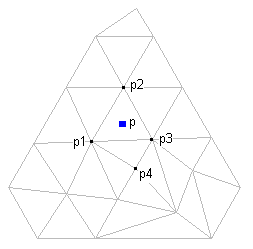Use Natural Neighbor Interpolation (NNI) to estimate the level (Z) of an arbitrary point (p) from a set of points with known levels.
The NNI method uses information in the triangulation from the known points to compute a weighted average of the levels of the natural neighbors of point p. The number of neighbors (the number of points whose Z-values are averaged to get the interpolated value) depends on the triangulation: it is the number of points to which a new point (p) would be connected if inserted into the surface:

Using NNI, you select only the output locations of the interpolated points. The levels of the interpolated points are always based on the weighted average of the levels of the existing neighboring points. The outcome of the NNI method is more predictable than the Kriging method. NNI interpolates only within the surface, whereas Kriging can extrapolate beyond the surface border based on a selected polygon.